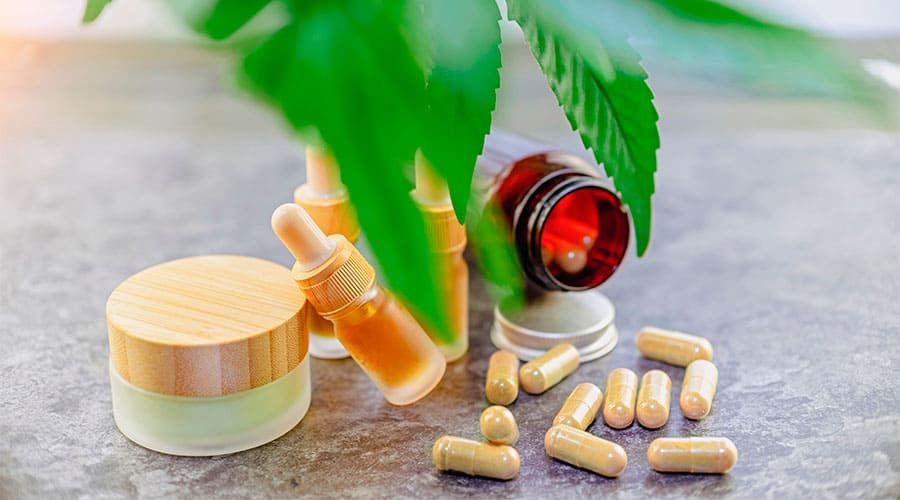HHC and delta 8 are two compounds that have been creating a stir in the cannabis industry. They have similar effects to delta 9 THC, the primary intoxicating component of weed. However, they can be created from industrial hemp, meaning they are widely available, even in some places where cannabis is not.
Although HHC and delta 8 are quite similar, there are also several differences to consider. This article explains the effects, benefits, and side effects of HHC vs. delta 8. We will also discuss the somewhat complicated legal status of these two cannabinoids.
What Is Delta 8?
Delta 8, also known as D8, is a form of THC. It exists in low quantities in cannabis plants but can also be manufactured from industrial hemp using CBD as a starting point. The process is called isomerization, and a growing number of companies are using it to create mind-altering cannabinoids from non-intoxicating hemp.

Delta 8 differs from delta 9 THC in the placement of a double bond in its chemical structure. Although the difference is relatively minor, it impacts the compound’s effects significantly, so D8 is around half as potent as D9.
This means it produces a milder high and is less likely to cause side effects than its infamous cousin.
What Is HHC?
HHC is short for hexahydrocannabinol. Like delta 8 and delta 9 THC, it is a cannabinoid with powerful psychoactive effects. Like D8, HHC does not occur naturally in high enough quantities to extract from cannabis plants. Therefore, it is usually made by converting hemp-derived CBD to THC, then to HHC, using a process called hydrogenation.
Hydrogenation is the chemical reaction that changes liquid vegetable oil into solid margarine. It involves replacing the double bond in THC’s chemical structure with two additional hydrogen atoms. This increases the compound’s shelf life dramatically.
Regarding its effects, people say HHC is slightly stronger than delta 8 but less potent than delta 9 THC.
What’s the Difference Between HHC and Delta 8?
The most significant difference between HHC and delta 8 lies in their chemical structure. As we mentioned earlier, HHC has two extra hydrogen atoms in place of a double bond. This small difference means that HHC is slightly more potent than delta 8.
Aside from that, the two cannabinoids are fairly similar. Both produce a relaxing, psychoactive high that is milder than regular cannabis.
They are also both generally made using hemp-derived CBD as a starting point. This means that they are more widely available than THC-rich cannabis strains, which are still illegal in many areas. However, there is some confusion surrounding the legality of the two chemicals, which we will discuss in detail below.
Comparing HHC and Delta 8 THC
| Comparison | Delta 8 | HHC |
|---|---|---|
| Potency | Mild to moderate | Moderate to strong |
| Legality | Federally legal | Federally legal |
| Benefits | Relaxation, calm, pain relief | Relaxation, calm, pain relief |
| Safety Profile | Likely safe, but more research is needed | Likely safe, but more research is needed |
| Product Types | Gummies, tinctures, capsules, vape carts, vape pens | Gummies, tinctures, capsules, vape carts, vape pens |
Effects of Delta 8 and HHC
There has not been much research into the effects of delta 8 and HHC in humans. However, a 2022 survey on delta 8 for the Journal of Cannabis Research gave some valuable insights.
The survey’s respondents were positive overall, citing delta 8’s effects as an altered sense of time (74%), relaxation (71%), euphoria (68%), and pain relief (55%). They also said that they were less likely to experience side effects like anxiety and paranoia than with delta 9.
There is less scientific data available on HHC’s effects. Anecdotal reports suggest they are similar to the delta 9 THC found in cannabis but slightly milder.
Are Delta 8 and HHC Legal?
Two of the most commonly searched terms relating to D8 and HHC are “is delta 8 THC legal” and “is HHC legal.” Unfortunately, the answer to these questions is not straightforward.
The short version is that both compounds are federally legal, provided they are manufactured from industrial hemp with no more than 0.3% delta 9 THC. Products containing D8 and HHC must also not exceed this limit.
However, some argue that since delta 8 and HHC are THC analogs, they are illegal under the Federal Analogs Act. Therefore, several states have banned the substances, alongside other novel cannabinoids like THC-O and delta 10.
At the time of writing, delta 8 is prohibited in the following states:
- Alaska
- Colorado
- Delaware
- Idaho
- Iowa
- Minnesota
- Montana
- Nevada
- New York
- North Dakota
- Oregon
- Rhode Island
- Utah
- Vermont
The laws on HHC are a little hazier, but it seems likely that it is illegal in all of the above states, plus:
- Arizona
- Arkansas
- Illinois
- Mississippi
- Washington
These laws are constantly changing, so check online for the latest updates to find out the legal status of delta 8 and HHC in your area.
Chemical Structures of THC and HHC
Like delta 9 THC, delta 8 has the molecular formula C₂₁H₃₀O₂. However, the delta 8 THC structure differs from delta 9 in the placement of a double bond. In delta 9 THC, the double bond is between its ninth and tenth carbon atoms, but in delta 8, it is between its eighth and ninth.
The HHC chemical structure is similar but has two extra hydrogen atoms in place of the double bond. Therefore, its molecular formula is C₂₁H₃₂O₂.
Will HHC or Delta 8 THC Affect Drug Testing?
The vast majority of US states now have some form of legal access to cannabis, either for medicinal or recreational use. However, countless employees are still subjected to regular drug testing, including for delta 9 THC.
Drug tests do not test for delta 9 THC, specifically. Instead, they test for the THC metabolite THC-COOH. So, does delta 8 show up on a drug test? Unfortunately, it does. The body metabolizes D8 similarly to D9, so it could trigger a positive urine test if it is present in high enough concentrations.

The answer to “does HHC show up on a drug test?” is probably similar. It affects the body similarly to delta 9 and delta 8 and will likely trigger a positive result if enough HHC is present in the urine.
The only way to be sure of a negative result is to abstain from using any cannabis products before testing. The amount of time required will depend upon one’s level of use and the type of testing used.
Those who only use cannabinoids occasionally may be clear in a matter of a few days. However, regular and heavy users may require as long as 90 days, especially for methods like hair follicle testing.
What Are the Benefits of Using HHC or Delta 8?
There has not been an enormous amount of research into the benefits of delta 8 and HHC. However, it seems likely that they will have similar uses to delta 9 THC, which has been studied for many decades. Some of the primary reasons why people use delta 9 (cannabis) include:
- Relaxation
- Relieving pain
- Enhancing mood
- Promoting sleep
- Reducing nausea
- Stimulating the appetite
One of the few existing clinical trials on delta 8’s benefits suggested that it could help to reduce vomiting associated with cancer treatment. The results showed that the cannabinoid had effective anti-emetic properties while causing negligible side effects of its own.
There has been even less research into HHC’s benefits, but they are likely to be similar. Another benefit of HHC is that it is very stable, meaning it should retain its potency for longer than other forms of THC.
What Are the Side Effects of HHC and Delta 8?
Reports suggest that delta 8 causes fewer side effects than delta 9, but it is not entirely without risk. The 2022 survey mentioned above found that consumers experienced difficulties with concentration and short-term memory after using the cannabinoid.
The FDA has also received numerous reports of delta 8 side effects, including:
- Anxiety
- Dizziness
- Confusion
- Hallucinations
- Vomiting
- Tremors
- Loss of consciousness
Most of these adverse reactions occurred after consuming edibles such as D8 gummies. The most likely reason is that edibles can take hours to kick in, making it all too easy to over-consume.
Less information on HHC’s side effects is available, but they are probably similar to those described above. Furthermore, HHC is stronger than delta 8, so the chance of having a negative reaction may be higher.
Summary on Delta 8 vs. HHC
There are plenty of similarities and also some differences when it comes to HHC vs. delta 8. Both have mind-altering effects that are slightly less potent than delta 9 THC.
They can be manufactured from industrial hemp and are widely available throughout the US. However, some states have banned the cannabinoids, so check your local laws before making a purchase.
Finally, although they are less likely to cause side effects than delta 9, delta 8 and HHC are not risk-free. Therefore, it is essential to use them responsibly as you would any other cannabis product.


![What Is Limonene? [Ultimate Cannabis Terpene Guide]](https://wayofleaf.co/wp-content/uploads/2020/04/what-is-limonene-1-640x225.jpg)
![17 Conditions CBD Oil Might Help With [NEW Studies!]](https://wayofleaf.co/wp-content/uploads/2019/03/wol_1920x450-16-640x225.jpg)








